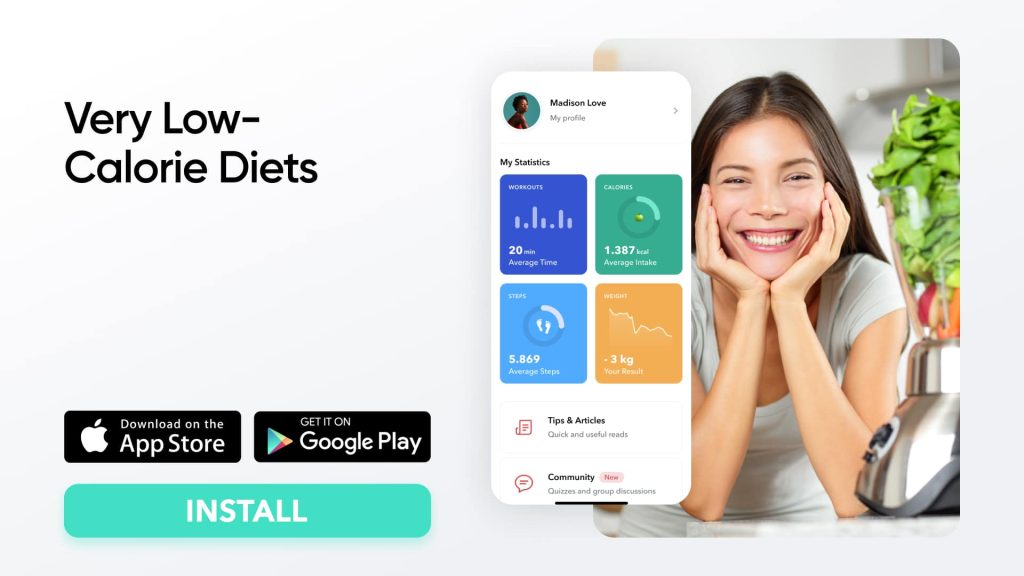The Basics Of A Healthy Weight Loss
With a great abundance of different nutrition plans, you are promised to achieve your desired results in a desirable method. If you aim for a healthy weight loss with the further maintenance of the target weight, you may try following the Mediterranean diet. If you want to slim down fast, some suggest sticking to a 500 calorie diet. But it is important to remember that no matter the result, you should always put your wellness and health first.
Get your personalized
meal plan!

A healthy weight loss includes a well-balanced nutritional plan and regular exercise. Your diet should be rich in all the vital nutrients, such as proteins, complex carbs, unsaturated fats, essential vitamins, and minerals (7). In order to shed pounds, you need to burn more calories than you consume (2). Nutritionists recommend that an average adult man should consume around 2500 calories a day, and an average adult woman’s daily caloric intake should contain about 2000 calories, (1) thus consuming 2000 and 1500 calories respectively is likely to lead to weight loss. You can calculate your own daily caloric needs with a calories burned calculator. So if consuming fewer calories than you burn is the base of the slimming process, does following the 500 calories diet bring you desired results, or only damage your health? As it creates a great caloric deficit.
The Concept Of A 500-Calorie Diet
The 500 calorie diet belongs to a group of very-low-calorie diets (VLCD), clearly, from its name, it restricts the daily caloric intake to 500 calories. The VLCDs are sometimes prescribed by doctors to help people with obesity, especially before surgeries, as reducing body fat may reduce the operative time, blood loss, and the risk of complications (8). Besides that, some people tend to use it as a rapid weight loss tool, which may not be a healthy choice, especially if followed for a longer period. One of the main rules of this nutritional plan is that it always requires medical supervision.
Read More: Different Types Of Diets: The Lowdown On The Most Talked-About Weight Loss Strategies
What To Eat On The 500-Calorie Diet?
Here are some of the foods that the 500 calorie diet allows you to eat:
-
Non-Starchy Vegetables
These include carrots, beetroots, broccoli, cabbage, lettuce, scallion, and parsnip. They are low in calories but packed with essential nutrients. The only rule here is that you need to make sure to pre-wash them before consuming them.
-
Fruits And Fruit Freshers
Fruits, just like vegetables, are a vital part of any diet, especially for a very-low-calorie one. They are filled with vitamins and minerals and are still relatively low in calories. You can also consume them in the form of freshers. The 500 calorie diet specifies that you should avoid high glycemic indexes (GI) fruits, such as grapes, pineapple, and mangos.
- Pre-cooked chicken and shrimps
- Salads, stir-fried, sautéed and blanched food
Using these methods of food preparation will reduce the disruption of valuable enzymes and phytonutrients.
- Olive oil sprays or spritzes, lime juice, salt, and pepper
These low-calorie salad dressings will add some flavor to your meal without drastically increasing its caloric value.
Yanking yourself back in shape has never been so easy with our game-changing fitness app! Start transforming your life with BetterMe!
Foods To Avoid On The 500-Calorie Diet
The 500 calorie diet plan excludes the following foods:
- Canned foods (vegetables, fruits, legumes, fish, etc.)
- Dried fruits
- Sugary foods (candies, cakes, pastries, baked sweets, desserts, etc.)
- Processed foods (sausages, salami, and others)
- Sweetened drinks (soda, store juices, energy drinks, etc.)
Benefits Of The 500-Calorie Diet
Due to its great caloric restrictions, the 500 calorie diet does not have that many benefits. Some may suggest that one of the main benefits of this diet is rapid weight loss. This may be beneficial for people who need to shed pounds to prevent health risks and follow this nutritional plan for a short time and under the medical supervision of specialists. In other cases, this diet may be quite harmful to your health and bear a lot of risks.
Risks And Dangers Of The 500-Calorie Diet
The extremely restrictive nature of the 500 calorie diet is not a safe variant for a lot of people. It is recommended that you should avoid this dietary plan if you suffer from the following conditions (8):
- Diabetes
- Heart disease
- Kidney disease
- Thyroid disease
- Gallstones
- Gout
Even if you haven’t experienced any of the abovementioned health problems, this diet can be quite dangerous for you, bearing the following risks:
-
Decreased Bone Strength
Following a diet that restricts a great number of calories for a long period may lead to a lack of essential minerals, which in turn decreases bone mineral density and weakens the bones (6).
-
Nutritional Deficiency
One of the aspects that almost all very-low-calorie diets have in common is the increased risk of nutritional deficiencies. Research shows that following the low-calorie diet for a long period may lead to a lack of several essential vitamins and minerals (3). It can also cause diarrhea, nausea, fatigue, and disruption of the menstrual cycle. Lack of fiber in your nutrition plan can cause constipation. This reduces the effectiveness of the immunity system and increases the risk of contracting different illnesses.
-
Muscle Loss
The 500 calorie diet weight loss process includes not only reducing your fat, but also muscle mass.
Read More: Meal Plans To Lose Weight: Simple Diet Plans, Menus, and Hacks to Lose Pounds Faster
-
Increased Risk Of Gallstones
Studies showed that sticking to a VLCD, such as a 500 calorie diet, may increase the risk of developing gallstones (5), which occur in the gallbladder and block the bile duct, causing abdominal pain.
-
Lack Of Healthy Fats
As fats are often rich in calories, the 500 calorie diet limits their consumption. The critically limited intake of healthy fats can reduce the absorption of essential fatty acids and fat-soluble vitamins A, D, E, and K, causing deficiencies.
-
Metabolic Changes
Research shows that a rapid weight loss caused by a low-calorie diet reduced the resting metabolic rate (RMR) (3). Following a VLCD for a long time may slow your metabolism, causing you to regain weight after you return to your original eating pattern.
Conclusion
A 500 calorie diet plan is very limiting and restrictive. It is often prescribed to people who suffer from obesity and requires medical supervision. Without that, it is considered an unhealthy way of losing weight and may have a lot of negative effects. Although it promises a rapid weight loss, you should never put your health at stake. That is why, try to stick to a diet that creates a moderate caloric deficit, while providing you with all the essential nutrients. But before making any changes in your nutritional plan, please consult your doctor.
DISCLAIMER:
This article is intended for general informational purposes only and does not address individual circumstances. It is not a substitute for professional advice or help and should not be relied on to make decisions of any kind. Any action you take upon the information presented in this article is strictly at your own risk and responsibility!
SOURCES:
-
- 8 tips for healthy eating (2019, nhs.uk)
- Counting calories: Get back to weight-loss basics (2020, mayoclinic.org)
- Effects of a low-calorie diet on resting metabolic rate and serum tri-iodothyronine levels in obese children (1999, pubmed.ncbi.nlm.nih.gov)
- Micronutrient deficiency in obese subjects undergoing low calorie diet (2012, ncbi.nlm.nih.gov)
- Risk of symptomatic gallstones and cholecystectomy after a very-low-calorie diet or low-calorie diet in a commercial weight loss program: 1-year matched cohort study (2014, ncbi.nlm.nih.gov)
- Weight Loss and Bone Mineral Density (2015, ncbi.nlm.nih.gov)
- What are the 6 essential nutrients? (2019, medicalnewstoday.com)
- What to know about the 500-calorie diet (2018, medicalnewstoday.com)













